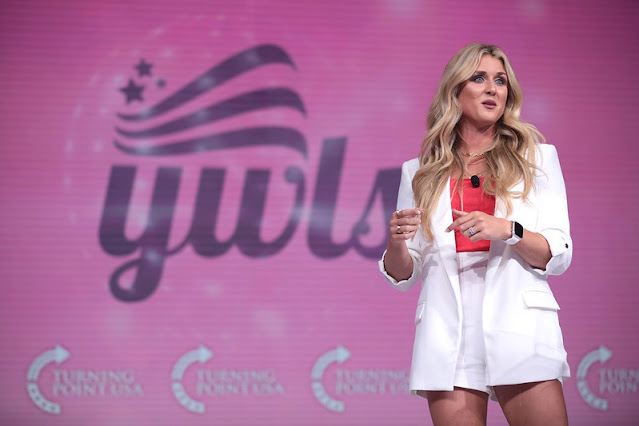Simone Biles Responds To Riley Gaines' Trans Athlete Comments: What Happened

|
| Simone Biles (right side) Calls Riley Gaines 'Sick' in Heated Trans Athlete Debate | Picture Source - Instagram |
The Core Of The Debate Between Riley And Biles
At the heart of the controversy is the question: Should transgender women be allowed to compete in women's sports? Proponents argue for inclusivity and equal rights, while opponents express concerns about fairness and safety. Two prominent figures—Olympic gymnast Simone Biles and former NCAA swimmer Riley Gaines—recently clashed over the issue, with Biles calling Gaines "truly sick" for her stance
Riley Gaines' Stance About Transgender Athletes.
Riley Gaines, a former NCAA swimmer, has become a vocal critic of transgender women competing in women's sports. She contends that transgender athletes, particularly those who transitioned after puberty, possess physical advantages over cisgender women, such as increased muscle mass and bone density. Gaines believes that allowing transgender women to compete in women's categories undermines the integrity of women's sports and erases the achievements of cisgender female athletes.
Her activism includes public speaking engagements, media appearances, and social media campaigns aimed at raising awareness about what she perceives as the unfairness of transgender women competing in women's sports. An article by breitbart.com reported, Riley said “Women are depending, girls are depending on these women with platforms and with influence to take a stance on this, so changes can ultimately be made,” on Varney & Co. show. Riley is putting so much efforts to bring this issue to notice and wants big names to comment and share their thoughts on this topic. In May 2025, Riley took to social media and asked Serena Williams and Venus Williams to comment on this topic, tagging them in her X post.
Each day for the next week I'm going to call on well-known female athletes to take a stance on this issue because silence is complicity...we need their voices.
— Riley Gaines (@Riley_Gaines_) May 8, 2023
Day 1: @serenawilliams @Venuseswilliams how do you feel about males competing against women?
Key Points from Gaines:
2. Safety Risks: Contact sports could pose safety risks for female athletes competing against transgender women.
3. Loss of Opportunities: Female athletes may lose scholarships, titles, and recognition if forced to compete against biological males.
4. Protecting Women’s Sports: Gaines believes policies should prioritize fairness for biological women.
Simone Biles' Responds To Riley Gaines

|
| Biles proposed establishing distinct categories for transgender athletes to encourage inclusivity. | Picture-Instagram |
Simone Biles, widely regarded as one of the greatest gymnasts of all time, has publicly disagreed with Gaines' views. Biles advocates for inclusivity and believes that sports should be accessible to all athletes, regardless of gender identity. She has suggested the creation of separate categories for transgender athletes to ensure fair competition while promoting inclusivity.
@Riley_Gaines_ You’re truly sick, all of this campaigning because you lost a race. Straight up sore loser. You should be uplifting the trans community and perhaps finding a way to make sports inclusive OR creating a new avenue where trans feel safe in sports. Maybe a transgender… https://t.co/pjpzuZ0AlO
— Simone Biles (@Simone_Biles) June 6, 2025
Biles’ comments quickly went viral, with many praising her for standing with the LGBTQ+ community, while others accused her of ignoring the biological realities of sports. Biles' stance has attracted both support and criticism. Supporters commend her for standing up for marginalized groups, while critics argue that her position could compromise the fairness of women's sports.
The Controversial Incident That Sparked Debate.
The dispute between Biles and Gaines intensified following an incident involving a transgender athlete. Gaines criticized a Minnesota high school softball team for having a transgender player, Marissa Rothenberger, who played a pivotal role in the team's state championship victory. Gaines' comments were perceived by many as derogatory and dismissive of transgender athletes.
In response, Biles labelled Gaines' remarks as "truly sick" and accused her of bullying transgender athletes under the guise of advocating for fairness. Biles emphasized the importance of supporting all athletes and condemned Gaines' behavior as harmful and divisive.
Public Reactions And Media Coverage
The exchange between Biles and Gaines has sparked widespread discussion across social media platforms and news outlets. Supporters of Biles praise her for using her platform to advocate for inclusivity and equality, while some critics argue that her comments undermine the concerns of cisgender female athletes.
Media coverage has varied, with some outlets highlighting the need for dialogue and understanding, while others focus on the polarized nature of the debate. The controversy underscores the complexities surrounding issues of gender, fairness, and inclusion in sports.
The Biles-Gaines dispute reflects a larger societal debate about the inclusion of transgender individuals in various aspects of life, including sports. As more transgender athletes emerge, sports organizations are grappling with how to create policies that balance fairness, inclusivity, and safety.
Some propose establishing separate categories for transgender athletes, while others advocate for policy changes that allow transgender women to compete in women's sports under certain conditions, such as hormone level regulations. The ongoing debate highlights the challenges of creating equitable and inclusive policies in a rapidly evolving societal landscape.
The clash between Simone Biles and Riley Gaines over the inclusion of transgender athletes in women's sports exemplifies the broader tensions between inclusivity and fairness. As the conversation continues, it is essential to engage in respectful dialogue, consider diverse perspectives, and strive for solutions that uphold the integrity of sports while promoting equality for all athletes.
DISCLAIMER: The Anecdotez team writes about stuff we think you'll like and may be helpful to people. Considerable time is spent in curating the correct information and present to you in a simple manner. Please leave a comment if you think any information is incorrect or requires a change. We will do the needful if found your suggestion aligning with our principles.

